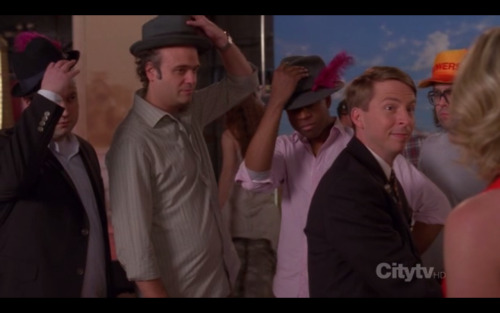 I like to think that the picture before you helped to bring Nick Offerman to FSU. Evan, UP's Comedy Talent Buyer, and I were clearly very dedicated to the cause. But in reality, this show had been in the works since the time I interviewed for this position, close to a year ago. And last night, he was able to come to campus for a combination lecture/standup/musical performance.
I like to think that the picture before you helped to bring Nick Offerman to FSU. Evan, UP's Comedy Talent Buyer, and I were clearly very dedicated to the cause. But in reality, this show had been in the works since the time I interviewed for this position, close to a year ago. And last night, he was able to come to campus for a combination lecture/standup/musical performance.I had no idea what to expect, but walked away so impressed by the man most of the world knows as Ron Swanson.
I formally started my career in programming in lectures, and so I take lectures on college campuses very seriously. As you will learn quickly from going to lecture showcases with me at conferences, or even talking to me about the topic for long enough, "I don't know much, but I know what I like." Moreover, lots of people have great stories to tell...but not all are engaging in how they tell it. I'd rather hear from someone who has a rich experience who can convey their story with sincerity, than exchange the name recognition of a reality TV star for a heavily coached, minimally impactful, rambling about a topic assigned by a booking agent or management company. Every now and then, however, I am pleasantly surprised by what an act brings to the table. Jill Zarin of Real Housewives of New York was a great example of this. As it happens, Nick Offerman pleasantly surprised me as well.
I don't want to ruin the lecture for those who are considering bringing it to campus, but I will share a few points. Nick is married to Megan Mullaly (of Will and Grace fame), and she figures prominently into his lecture. He talks about funny moments in their marriage, how they sustain their marriage, and how much of a romantic he is with her. It's refreshing to see a man so revered for his character's love of hunting, meat, and manly pursuits be so open about the love he has for his wife.
He also speaks in a highly entertaining fashion about how people should have hobbies and live lives "offline". Accompanied by a song, he talks about redirecting energy from phones and apps into actual life pursuits ("instead of playing 'Draw Something', why not f***ing DRAW something?"). Nick is also an accomplished woodworker, and that figures prominently into his act as well.
Other topics of discussion include religion, politics, relationships and individuality. His parting words of wisdom? "Paddle your own canoe." I want him to carve that into a wood plaque for me, I so enjoyed that particular bit.
He is a well-read, well-spoken, humble, polite, and quietly brilliant man who was an absolute pleasure to host on campus. I feel as though he imparted a lot of great lessons to our students in an entertaining and engaging way. I learned a lot from what he said, and hope to impart some of those lessons into my life as well. Easily one of my favorite events, start to finish, that I've ever been a part of. Thanks so much to the student staff of Union Productions for planning and promoting such a smoothly run, well-received event. I love my job every day, but this was a GREAT day :)







